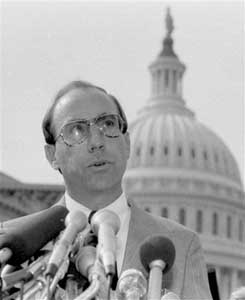-
- First openly gay person elected to Congress dead at 69
- Interview: Minneapolis fire chief unsure about return
- AIDS activist Jeff Getty dead at 49
- Same-sex R.I. couple weds in Mass. after judge gives the OK
- AP Interview: Beebe says gay foster parents could cause stigma
- Second-grade teacher ‘outs’ himself to classroom
- National News Briefs
- World News Briefs
national
First openly gay person elected to Congress dead at 69
Husband says Gerry Studds’ re-election after outing gave gays courage
Published Thursday, 19-Oct-2006 in issue 982
BOSTON (AP) – Former Rep. Gerry Studds, who became the first openly gay member of Congress when his homosexuality was exposed during a teenage page sex scandal, died early on Oct. 14. He was 69.
Studds died several days after he was admitted to the hospital after collapsing while walking his dog, his husband said. Studds fell unconscious on Oct. 3 because of what doctors at Boston Medical Center later determined was a blood clot in his lung, Dean Hara said.
Studds regained consciousness and seemed to be improving, but his condition deteriorated Oct. 13 because of a second blood clot. The origin of the second clot was not immediately determined, said Hara, who married Studds shortly after same-sex marriage was legalized in Massachusetts in 2004.
Hara said Studds gave courage to gays and lesbians by winning re-election after publicly acknowledging his homosexuality.
“He gave people of his generation, of my generation, of future generations, the courage to do whatever they wanted to do,” said Hara, 49.
Studds was first elected to the congressional district that represents Cape Cod and the Islands, New Bedford, and the South Shore in 1972, and quickly became known for his work to protect the marine environment and fishing industry.
In 1983, a 27-year-old man stepped forward to disclose that he and Studds had had a sexual relationship a decade earlier when he was a teenage congressional page. The U.S. House of Representatives censured Studds, who revealed on the House floor that he was gay.
At the time, Studds called the relationship with the teenage page, which included a trip to Europe, “a very serious error in judgment.” But Studds did not apologize and defended the relationship as a consensual relationship with a young adult. The page later appeared publicly with Studds in support of him.
Studds told his House colleagues that everyone faces a daily challenge of balancing public and private lives.
“These challenges are made substantially more complex when one is, as am I, both an elected public official and gay,” Studds said at the time.
Still, the voters even in his conservative district back home continued to re-elect him until he retired in 1997 to become a lobbyist for the fishing industry and environmental causes.
The scandal recently resurfaced after former Republican Rep. Mark Foley resigned after exchanging sexually explicit instant messages with a page. Republicans have accused Democrats of hypocrisy for savaging Foley but saying little about Studds at the time.
During his congressional career, Studds was hailed by locals for his work establishing a limit for foreign fishing vessels 200 miles from the coast. In 1996, Congress named the 842-square-mile Gerry E. Studds Stellwagen Bank National Marine Sanctuary after him in recognition of his work protecting the marine environment.
His work in Congress and his love of the sea drew praise from his former Democratic colleagues.
“Gerry’s leadership changed Massachusetts forever and we’ll never forget him,” U.S. Sen. Edward Kennedy, D-Mass., said in a written statement. “His work on behalf of our fishing industry and the protection of our waters has guided the fishing industry into the future and ensured that generations to come will have the opportunity to love and learn from the sea.
“He was a steward of the oceans,” Kennedy said.
In his early career, Studds was also known for his opposition to the Vietnam War and military intervention in Central America. Studds later became an advocate for a stronger federal response to the AIDS crisis. He was among the first members of Congress to endorse lifting the ban on gays, lesbians and bisexuals serving in the military. In 1994, Studds and Kennedy introduced the Employment Non-Discrimination Act, designed to end workplace discrimination based on sexual orientation.
Hara said Studds did not have the outgoing personality of a typical politician. But Hara said Studds was committed to political life because he wanted to work on issues that were important to his constituents. He was a shy, quiet person,” Hara said. “He would prefer a dinner for four, as opposed to a dinner for 400.”
Studds was born May 12, 1937, in Mineola, N.Y. He graduated from Yale in 1961 with a master’s degree in history and then spent two years as a foreign service officer with the State Department.
He worked in the Kennedy administration as executive assistant to the presidential consultant for a domestic Peace Corps and then spent 1964 as legislative assistant to Sen. Harrison Williams, D-N.J., who was later convicted in the Abscam bribery scandal.
Studds taught history at St. Paul’s, an exclusive boys boarding school in Concord, N.H., from 1965 to 1969. He moved to Massachusetts the next year and worked in the office of the president of the state university.
After an unsuccessful bid for the House in 1970, he responded by campaigning more vigorously, even learning Portuguese so he could speak to voters in the fishing city of New Bedford.
Besides Hara, Studds is survived by his brother, Colin, and sister-in-law, Mary Lou Studds, of Cohasset; his sister, Gaynor Stewart of Buffalo, N.Y., and four nephews. Funeral arraignments were not immediately known.
|
|
Copyright © 2003-2025 Uptown Publications


